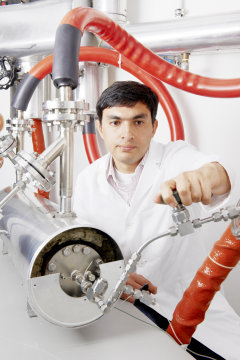May 15, 2012
 |
| Technicians at the Helmholtz Centre have established a new test laboratory especially for the characterisation of hydrogen tanks. |
The European Technology Initiative, “Fuel Cells and Hydrogen Joint Undertaking” (FCH JU), is providing approx 2.3 million euro of finance for the development of new hydrogen solid-state containers on the basis of boron hydrides.These compounds absorb much more hydrogen, the tanks remain compact.The “Bor4Store” project is being coordinated by the Institute of Material Research at the Helmholtz-Zentrum Geesthacht.
Fuel prices of around 1.70 euro per litre and high prices for heating oil mean that many car drivers, house owners or tenants yearn for more economic alternatives. One thing is certain: in the future petrol and heating oil are not getting any cheaper – partly due to the fact that our oil reserves are depleting. Science and industry are focusing on a possible alternative source of energy - hydrogen and fuel cell. Hydrogen can be produced, independent of oil, by means of solar energy, wind or water power and converted into electricity and heat in the fuel cell.
In this way; Electricity could be provided for mobile devices such as smartphones, stationary generators for telecommuniation stations or residential buildings. The prerequisite is that the hydrogen is made available in a compact and safe form i.e. suitable for everyday use.The storage unit should be as small as possible and absorb hydrogen and release it to the fuel cell under moderate temperatures and pressure conditions. Materials researchers at the Helmholtz Centre Geesthacht have been investigating storage in solid materials, so-called metal hydrides, for some time.
The objective of the new research project is to develop innovative storage materials on the basis of boron hydrides. As the materials research scientist and project coordinator, Dr. Klaus Taube of the Helmholtz-Zentrum Geesthacht, explains: “Boron hydrides have the highest hydrogen capacities of all known metal hydride storage materials. With the use of these innovative materials, approx. five kilograms of hydrogen could be stored in a 50 litre container, which is equivalent to the tank of a medium class car. This would suffice for a distance of approx. 400 to 500 kilometres - and at the production cost, which industry is striving to achieve in future, of around ten euros for a tankful of hydrogen “.
The recently initiated project, Bor4Store, aims to develop a first tank prototype which delivers energy for a solid oxide fuel cell and thus presents a model for the supply of electric power to stationary applications. The planned tests will focus on various kinds of boron hydride and also on a basic characterisation of the complex reactions which occur during the process of filling and emptying of hydrogen into and out of the tank. On the basis of this knowledge, specific catalysts will be investigated to achieve the fastest reactions possible and a high level of stability of the storage properties during numerous filling and emptying cycles of the tank.
The material properties are being optimised in the HyTech laboratory at the Helmholtz Centre and a suitable storage tank is being built and tested. As the project progresses, the interaction with the solid oxide fuel cell will be improved at the premises of our industrial partner. A further focus is on the development of economic methods for the synthesis of the storage materials, since the homes of the future will only use heat and electricity generated from hydrogen, if hydrogen tank systems are cheaper - making a perusal of the fuel bill a more pleasurable occupation.
Multinational Project
The “Nanotechnology“ department of the Institute of Materials Research at the Helmholtz Centre is working on this project in cooperation with scientists from Norway, Denmark, Switzerland, Italy, Greece, two medium-sized companies from Germany and the Czech Republic and a large company from Spain. The scientists, who have named their project Bor4Store, met in Geesthacht from 23rd to the 25th of April 2012 for an initial kick-off workshop.
The total budget invested in this project by the Helmholtz Centre Geesthacht amounts to 330.000 euro. It is also being supported by the FCH JU with the sum of 2.270.000 euro.
The Project-Participants are:
- HELMHOLTZ-ZENTRUM GEESTHACHT FÜR MATERIAL- und KÜSTENFORSCHUNG GMBH, Germany
- ABENGOA HIDRÓGENO, SA., Seville, Spain
- ZOZ GMBH, Wenden, Germany
- KATCHEM SPOL S.R.O., Prague, Czech Republic
- AARHUS UNIVERSITET, Denmark
- INSTITUTT FOR ENERGITEKNIKK, Kjeller, Norway
- UNIVERSITA’ DEGLI STUDI DI TORINO, Italy
- EIDGENÖSSISCHE MATERIALPRUEFUNGS- UND FORSCHUNGSANSTALT, Dübendorf, Switzerland
- NATIONAL CENTER FOR SCIENTIFIC RESEARCH “DEMOKRITOS”, Aghia Paraskevi / Athens, Greece
0 comments:
Post a Comment